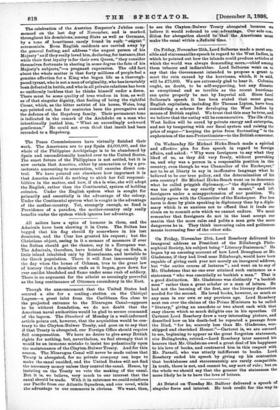On Friday, November 25th, Lord Rosebery delivered his inaugural address
as President of the Edinburgh Philo- sophical Society, his subject being " Literary Statesmen." He began by an amusing account of how Lord Brougham or Mr. Gladstone, if they had lived near Edinburgh, would have been capable of giving each year not merely an inaugural address, but "the entire course of lectures "; and went on to say of Mr. Gladstone that no one ever attained such eminence as a statesman "who was essentially so bookish a man." That is a good distinction. Mr. Gladstone was distinctly "a bookish man" rather than a great scholar or a man of letters. He had not the learning of the first, nor the literary discretion needed for the second. He loved books, however, as much as any man in our own or any previous age. Lord Rosebery next ran over the claims of the Prime Ministers to be called "literary," giving an anecdote or two about each with that easy charm which so much delights one in his speeches. Of Carteret Lord Rosebery drew a very interesting picture, and described how on his death-bed he repeated a passage from the Iliad, " for he, scarcely less than Mr. Gladstone, wor- shipped and cherished Homer."—Carteret is, we are amused to see, beginning to appear as the great forgotten statesman, vice Bolingbroke, retired.—Lord Rosebery later assured his hearers that Mr. Gladstone owed a great deal of his happiness to his love of books, and contrasted him in this respect with Mr. Parnell, who was utterly indifferent to books. Lord Rosebery ended his speech by giving up his contention that bookishness and statesmanship are rarely compatible. In truth, there is not, and cannot be, any sort of rule ; but on the whole we should say that the greater the statesman the more likely he is to have the love of letters.






















































 Previous page
Previous page